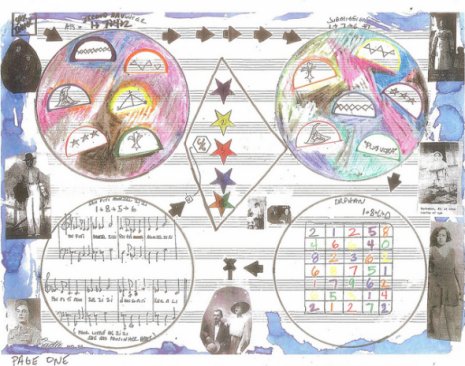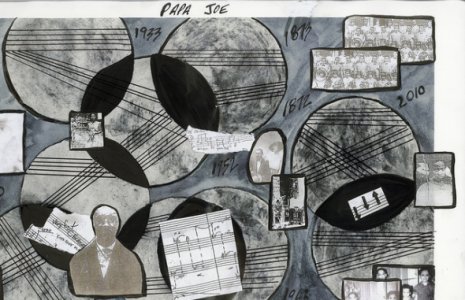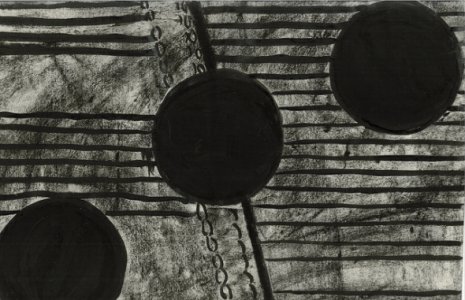Chapter Two
MM:
I find there are some converging tendencies related to creative notions of scores that have been influenced by, say, Cecil Taylor, Anthony Braxton, Butch Morris, John Cage, Yoko Ono, and Pauline Oliveros. Some of your recent graphic notation uses the visual icons of Western music such as the Grand Staff, but not as a typically functional way, but more a visual trope. Can you talk about that?
MR:
I really can't yet. I'm still trying to codify a language that makes sense to me, much of it is instinctual in terms of what I enjoy looking at when I am considering a piece of music or a piece of art.
MM:
Coin Coin is a richly complex and extended work inspired from your family in the South. Specifically, what kind of sound is conjured up for you from these experiences and memories? When I listen to it, it takes me back somewhere and is very social and abstract in its specificity. At this juncture in your music making, what questions are important for you? How has this changed from five years ago?
MR:
On a practical level I just wonder more about how I will survive for the long haul keeping my creativity and spirit protected in the process of making certain decisions and continued sacrifices. Creatively I feel it's time to shed a few things and make certain elements that truly interest me a bit more central. I need to better synthesize all that I have learned as an experimentalist and really hone in on what I wish to focus on for this next phase. The business side of art life is beginning to become a bit of a distraction from my craft side so I also have to find a better way to deal with business while still protecting creative time.
MM:
I’m interested in location and sound, and your early influences. You grew up in Chicago. Did you have any contact with the highly influential AACM (Association of Advancement of Creative Musicians)? Was that something that had varying meaning for you as time went on? Can you talk about that sequence of events? Do you consider yourself 2nd or 3rd generation or do you even think in those terms?
MR:
I am a past member of the AACM but do not think of myself in terms of being a part of the organization's generational tier, which used to bother me a bit, but I just was not as heavily mentored as some other musicians I would list in that storied trajectory, like Corey Wilkes, Isaiah Spencer or even Nicole Mitchell. I just was not in Chicago long enough. But being even a fringe member of the organization did, at one point, fill me with a certain sense of hometown pride and joy and hope for art. The AACM is a very special organization and I feel very privileged to have experienced those feelings amongst those incredibly gifted and visionary folks.
Yes, I did grow in Chicago, but I am the child of a political scholar/scientist, and we moved a fair amount for a while as my father completed his academic studies. My mother was a university administrator and community activist. Both of my parents, and many in my extended family, were big supporters of the arts. But it was always spawned from a political framework for them, and so, now, onwards through me. My parents were very hearty 1970's black radicals who saw African- American artistic expression of the time as a means for cultural change and purpose. I first came across the AACM thanks to my parents and their record collection. I grew up in a home surrounded by books and records, but I didn’t pay attention to the AACM recordings for quite some time. Thanks to free music, theater, art classes and lessons in the various public schools I attended, at one point I had decided that I wanted to be an orchestral player, and put my focus there for many years. I switched to saxophone for good, in the middle of my undergraduate college studies, which was when I started exploring improvisation, the local music scene and I met AACM members at local jam sessions. The most crucial people for my development at that time were Reggie Willis (a past member), Fred Anderson, Ari Brown, Nicole Mitchell, saxophonist David Boykin (another past member), drummer Chad Taylor and the bassist Josh Abrams who wasn't a member but worked very closely and frequently with many AACM members so he could have easily been a member.
I was always a bit on the fringe in terms of the inner workings of the AACM and never participated in any organizational work on their behalf. Fred Anderson offered me gigs at his club the Velvet Lounge and the other musicians I listed above offered many words of kindness and encouragement and, in some cases, opportunities for really interesting collaboration. For a year I worked with children at the AACM school, teaching music, but I was not a member then either. It wasn't until right before I finished my graduate studies at the New England Conservatory (2001), that I was asked to become an associate member of the Chicago organization that meant being a part time distant member. I was never really that involved, because of my distance, and never participated in or saw much of the going on's/inner workings of the group, as say members like Nicole Mitchell, Jeff Parker, Tomeka Reid, Mike Reid or Ann Ward. Those musicians have worked very hard on behalf of the AACM. Their love and dedication to art forever astounds me.
When I moved to New York, I reached out to the New York organization. Connecting with them took awhile but eventually, mostly in thanks to the great George Lewis and the wonderful Muhal Richard Abrams, I was able to start interacting with some New York members. I still was not involved with the inner workings of the organization but I played a fair number of concerts with people who were members, and greatly cherish those opportunities. I owe a great deal of gratitude to many of the New York members for their encouragement during some of my time in New York. Again, Muhal Richard Abrams, George Lewis, Amina Claudine Myers, Henry Threadgill, Joseph Jarman, Roscoe Mitchell, Anthony Braxton, and Reggie Nicholson all offered me words of encouragement as I became a more rooted New Yorker. It was really nice to have some impression of a Chicago I loved so much through these historic arts elders. At one point I was hoping to take composition lessons with Mr. Abrams, but that never worked out schedule wise. Now I think it was a good thing as it forced me to rely on myself, and continue a certain auto-didactic approach.
I never studied music composition, and, to be honest, I was discouraged by many of my early university professors for trying to pursue being a composer or even a musician. I had one professor tell me that the only way I'd ever get a gig would be by marrying a musician! The AACM helped bolster ideas that my parents and extended family also often communicated to me: the idea that I should always hold in suspicion anyone who had anything to say about my "abilities” and that any sense of failure was a residual of my own choices about my own path, not something placed there by others.
Eventually I began to feel that the legacy of the organization weighed too heavily on my creative heart and soul. I started to feel self-conscious about my creative choices and I felt I could not explore my path in ways that felt both fully honest to me and respectful to the AACM's purpose and legacy. So in 2010 I became a past member of the organization. Their existence is so monumental and meaningful to the history of not just African-American experimental expression but American experimental expression as a whole.




